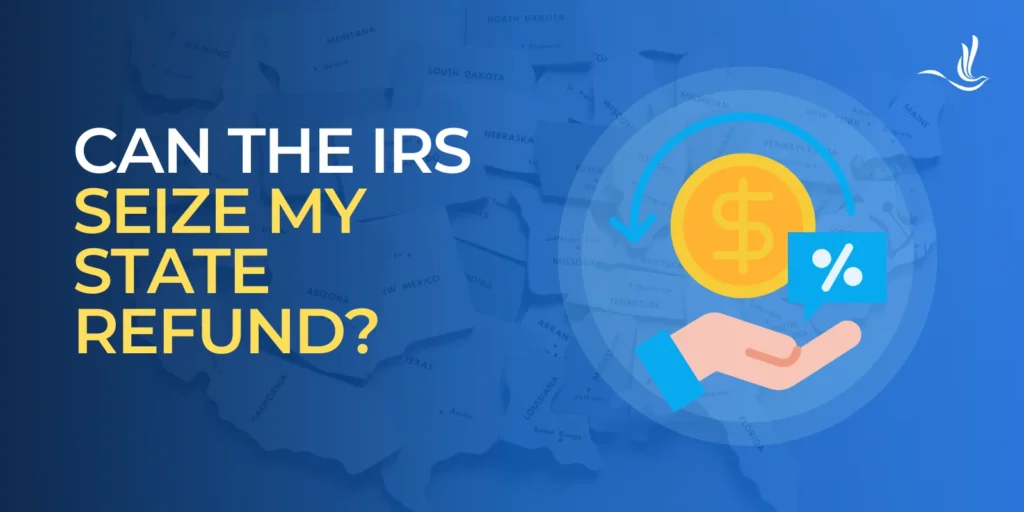
The IRS, as the federal tax collection agency, has broad powers to collect unpaid taxes. While it can garnish wages, seize assets, and levy bank accounts to satisfy federal tax debts, the question arises: Can the IRS seize your state tax refund to pay off federal tax liabilities? The answer is yes — under the State Income Tax Levy Program (SITLP), the IRS can seize state tax refunds to satisfy federal tax debts.
What Is the State Income Tax Levy Program (SITLP)?
The State Income Tax Levy Program allows the IRS to collect unpaid federal tax debts by intercepting state tax refunds. Through agreements with state tax agencies, the IRS can issue a levy on your state tax refund to cover outstanding federal tax liabilities. This program is a collaborative effort between the IRS and participating state tax agencies. Currently, there are 42 states that participate in the SITLP: Alabama, Arizona, Arkansas, California, Colorado, Connecticut, Delaware, District of Columbia, Georgia, Idaho, Illinois, Indiana, Iowa, Kansas, Kentucky, Louisiana, Maine, Maryland, Massachusetts, Michigan, Minnesota, Mississippi, Missouri, Nebraska, New Jersey, New Mexico, New York, North Carolina, Ohio, Oklahoma, Oregon, Pennsylvania, Rhode Island, South Carolina, Utah, Vermont, Virginia, West Virginia, and Wisconsin.
The states that do not participate are the ones that do not tax state income: Alaska, Florida, Nevada, New Hampshire, South Dakota, Tennessee, Texas, Washington, and Wyoming. Once you have an unpaid federal tax debt, the IRS may notify the state, and your state tax refund could be redirected to satisfy part or all of your federal tax obligation.
How Does the Process Work?
If the IRS intends to seize your state tax refund through the SITLP, it must follow a specific process.
IRS Sends Notices
Before seizing any funds, the IRS will send you multiple notices regarding your unpaid tax debt. These notices typically escalate from reminder notices to final demands for payment. You should receive a Notice of Intent to Levy and a Notice of Your Right to a Hearing before any levy action takes place.
State Cooperation
If you still do not pay your federal tax debt after receiving notices, the IRS will notify the state where you filed a tax return and are expecting a refund. The state, under the SITLP, will then intercept your state tax refund and send it to the IRS.
Refund Seizure
Once the state agency processes your refund, the IRS collects the funds to offset your tax debt. If the state tax refund does not cover the entire amount owed, the IRS can continue to pursue other collection methods for the remaining balance.
Notification
After your state refund is seized, the IRS will send you IRS Notice CP92 informing you of the levy action, detailing how much of your refund was applied to your tax debt.
How Can You Avoid a State Tax Refund Seizure?
There are several steps you can take to avoid having your state tax refund seized by the IRS:
Pay the Debt in Full
The simplest way to prevent a levy is to pay your federal tax debt in full before the IRS takes action. If you can’t pay the entire amount, look into other payment options.
Set Up a Payment Plan
You may be able to avoid a levy by setting up a payment plan or Installment Agreement with the IRS. This allows you to pay off your tax debt in smaller, more manageable payments over time. Once an agreement is in place, the IRS typically halts any levy actions.
Request an Offer in Compromise
If you are experiencing financial hardship and cannot pay the full amount owed, you may qualify for an Offer in Compromise, which allows you to settle your tax debt for less than what you owe. While this process can be lengthy and difficult, it may provide relief and prevent future levy actions.
File for a Collection Due Process (CDP) Hearing
If you receive a Notice of Intent to Levy, you have the right to request a Collection Due Process hearing. During this hearing, you can negotiate with the IRS or dispute the levy. Filing for a CDP hearing may temporarily stop the levy process while your case is under review.
Address Delinquent Tax Returns
If you have unfiled tax returns, the IRS may escalate collection efforts. Filing all overdue returns and paying any amounts owed may help prevent state refund seizures.
Tax Help for Those Who Owe
The IRS can seize your state tax refund through the State Income Tax Levy Program if you owe unpaid federal taxes. The process involves notifying you of your tax debt, coordinating with your state tax agency, and levying your state tax refund to satisfy your federal liabilities. To avoid this, it’s essential to stay on top of your tax obligations. Be sure to seek payment arrangements, and respond to IRS notices promptly. Whether through payment arrangements, appealing the levy, or seeking professional assistance, there are ways to resolve your tax debt and minimize the impact on your income. Optima Tax Relief is the nation’s leading tax resolution firm with over $3 billion in resolved tax liabilities.
If You Need Tax Help, Contact Us Today for a Free Consultation